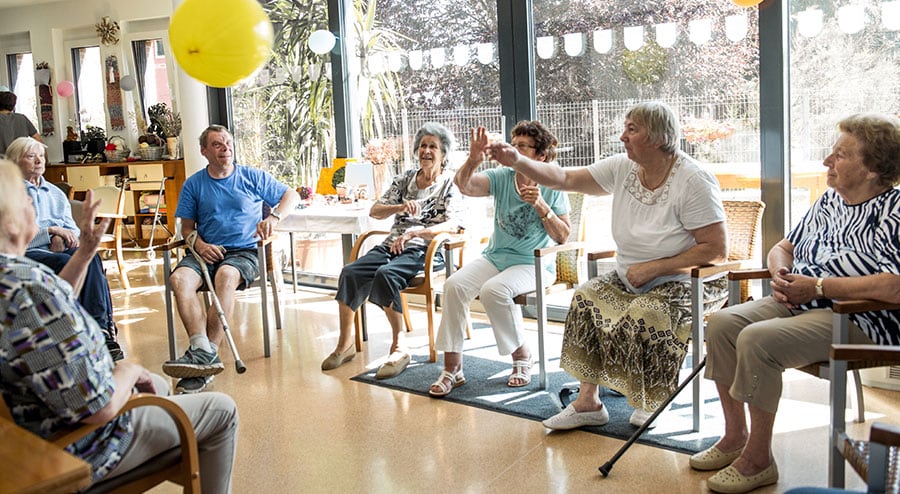Exactly How Assisted Living Facilities Enhance High Quality of Life for Those With Mental deterioration
Assisted living facilities play a crucial role in boosting the lifestyle for people with mental deterioration by implementing tailored treatment strategies that accommodate their distinct requirements. These settings combine organized tasks with psychological support, cultivating a sense of community while making sure safety and security and independence. The combination of engaging programs and family members involvement additionally enhances the residents' experience. The intricacies of dementia care continue to develop, prompting a better evaluation of exactly how these facilities adapt and introduce to satisfy the obstacles encountered by residents and their households. What effects does this have for future treatment versions?
Personalized Treatment Plans
A well-structured customized treatment plan usually includes specific objectives connected to health administration, day-to-day activities, and social engagement. It represents the person's cognitive decline while promoting self-reliance and dignity. Regular assessments and updates to the treatment plan are important, as they permit adjustments based on the local's advancing condition and choices.
Key components of these strategies commonly include medication administration, behavior assistance techniques, and nutritional standards tailored to the person's demands (Memory Care). By concentrating on customized treatment, aided living facilities can cultivate an encouraging environment that improves the lifestyle for individuals with dementia, inevitably adding to their general health and happiness. This customized method values the originality of each citizen, guaranteeing they receive the caring treatment they call for

Involving Activities and Programs
Engaging homeowners in significant tasks and programs is important for boosting the high quality of life for individuals with mental deterioration. These activities not just supply satisfaction however additionally boost cognitive function and advertise social communication, which can minimize sensations of seclusion typically experienced by citizens.

In addition, individualized programs are essential in making certain that each homeowner's distinct preferences and capabilities are acknowledged. This tailored method urges participation, boosts self-confidence, and provides a feeling of accomplishment.
Moreover, normal evaluations of locals' interests can assist team change and adapt tasks to better fit progressing demands. By focusing on interesting tasks and programs, aided living facilities can significantly enhance the overall experience and emotional health and wellness of individuals coping with dementia.
Safe and Helpful Environment
Creating a risk-free and encouraging environment is vital for people with dementia, as it straight impacts their wellness and quality of life. Helped living centers are developed with particular attributes that promote safety and security while fostering a complacency and comfort. These environments focus on access, with formats that decrease complication and motivate independence, allowing homeowners to navigate their environments much more quickly.
Precaution, such as safe and secure entryways and departures, prevent roaming and unauthorized access, which are vital considerations for individuals with mental deterioration (Assisted Living). Team participants are trained to identify the special demands of residents, giving customized assistance and guidance to ensure their security. The consolidation of soothing colors and familiar items can help decrease anxiousness and disorientation, developing a more calming ambience.
In addition to physical safety and security, emotional assistance is vital. Facilities typically use personnel who are not only knowledgeable in caregiving however likewise learnt empathy and communication, promoting trust and relationship with locals. This holistic method adds to a nurturing atmosphere where individuals really feel valued and recognized, inevitably enhancing their overall lifestyle.
Social Interaction and Community
An encouraging setting not only prioritizes safety and security however likewise cultivates chances for social communication and community engagement, which are vital for individuals with mental deterioration. In nursing home, structured activities and common spaces urge homeowners to connect with one another, lowering sensations of seclusion frequently experienced by those with cognitive disabilities.
Social interaction plays a significant function in boosting psychological wellness and cognitive function (Assisted Living). Engaging with peers in team tasks such as games, arts and crafts, or exercise not just promotes cognitive capacities however additionally nurtures a feeling of belonging. Facilities often organize events that promote socialization, allowing locals to construct connections and share experiences, which can be specifically beneficial for those with dementia
In addition, a dynamic community ambience can improve the i thought about this general top quality of life for citizens. Staff participants are trained to facilitate interactions and assistance citizens in creating significant connections.
Family Members Involvement and Support
Household participation is vital in supporting people with mental deterioration in assisted living atmospheres. Actively involving household members not just gives emotional comfort to residents but also fosters a feeling of belonging and continuity in their lives. When family members take part in care planning and everyday tasks, they contribute valuable insights about the individual's choices, history, and needs, which can improve tailored care.
In addition, normal family visits can considerably improve the psychological health of residents, reducing sensations of seclusion and stress and anxiety. Relative can additionally aid in preserving cognitive feature by involving their enjoyed ones in acquainted conversations and activities. This interaction reinforces personal identification and assists locals feel valued and recognized.

(Dementia Care Charlotte)These initiatives equip families to recognize mental deterioration better and create efficient communication methods, consequently boosting the high quality of treatment given. Eventually, a joint method between households and care staff creates a nurturing environment that promotes dignity, respect, and overall top quality of life for individuals with mental deterioration.
Conclusion
In conclusion, aided living facilities significantly boost the quality of life for people with dementia with customized treatment strategies, engaging tasks, and a safe environment. Jointly, these aspects create a holistic approach to care that addresses the distinct demands of people with mental deterioration, advertising general wellness and dignity.
Comments on “Get professional care and comfort with trusted Assisted Living providers.”